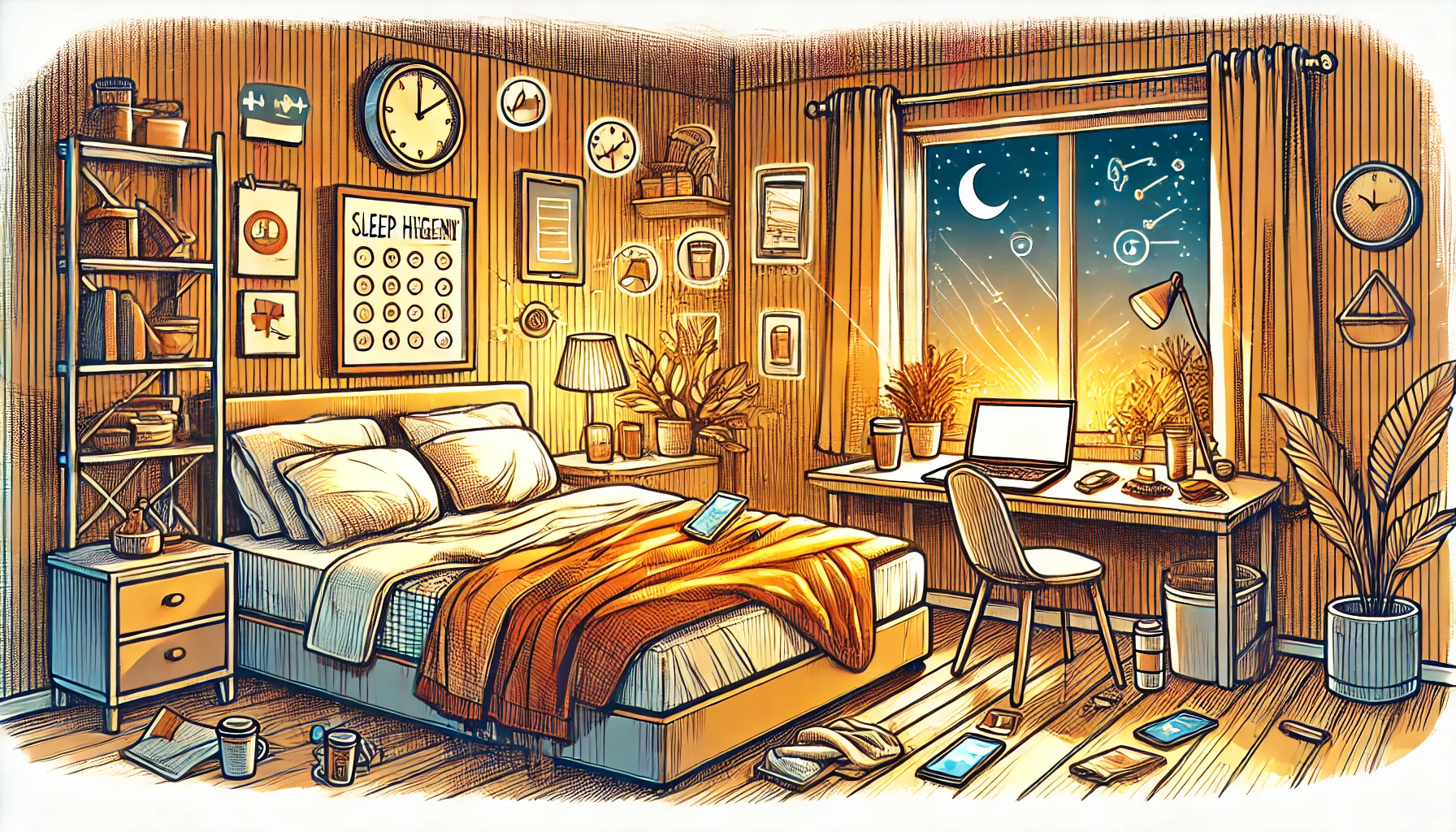Good sleep hygiene is essential for achieving restful and rejuvenating sleep. However, many people inadvertently make mistakes that disrupt their sleep quality and overall well-being. Understanding and avoiding these common sleep hygiene mistakes can significantly improve your sleep patterns and health. This blog post will explore the top sleep hygiene mistakes and provide practical tips to help you avoid them.
1. Inconsistent Sleep Schedule
- Erratic Bedtimes: Going to bed and waking up at different times each day disrupts your body’s internal clock, making it harder to fall asleep and wake up naturally.
- Weekend Sleep-Ins: Sleeping in on weekends to “catch up” on sleep can throw off your sleep schedule, leading to Sunday night insomnia and Monday morning grogginess.
- Solution: Maintain a consistent sleep schedule, even on weekends, to regulate your circadian rhythm and improve sleep quality.
2. Excessive Screen Time Before Bed
- Blue Light Exposure: The blue light emitted by phones, tablets, and computers can suppress melatonin production, making it difficult to fall asleep.
- Mental Stimulation: Engaging with stimulating content, such as social media or exciting TV shows, can keep your mind active and delay sleep onset.
- Solution: Avoid screens at least an hour before bed. Instead, engage in calming activities like reading a book or practicing relaxation exercises.
3. Poor Sleep Environment
- Light Pollution: Excessive light in your bedroom, whether from streetlights or electronic devices, can interfere with your ability to fall and stay asleep.
- Noise Disturbances: Loud or inconsistent noises can disrupt your sleep cycles and reduce sleep quality.
- Uncomfortable Bedding: An uncomfortable mattress or pillows can cause physical discomfort, leading to frequent awakenings.
- Solution: Create a dark, quiet, and comfortable sleep environment by using blackout curtains, white noise machines, and investing in quality bedding.
4. Consuming Caffeine or Nicotine Late in the Day
- Stimulants: Caffeine and nicotine are stimulants that can interfere with your ability to fall asleep and stay asleep.
- Evening Consumption: Consuming these substances in the afternoon or evening can disrupt your sleep patterns.
- Solution: Limit caffeine and nicotine intake, especially in the late afternoon and evening. Opt for herbal teas or other non-caffeinated beverages instead.
5. Eating Heavy Meals Close to Bedtime
- Indigestion: Large, heavy meals can cause discomfort and indigestion, making it difficult to fall asleep.
- Acid Reflux: Eating close to bedtime increases the risk of acid reflux, which can disturb sleep.
- Solution: Avoid heavy meals at least 2-3 hours before bedtime. If you’re hungry, choose a light, healthy snack.
6. Lack of a Pre-Sleep Routine
- No Wind-Down Time: Going straight to bed without a relaxing pre-sleep routine can make it difficult to transition from wakefulness to sleep.
- Inconsistent Activities: Engaging in different activities each night can confuse your body about when it’s time to sleep.
- Solution: Establish a consistent pre-sleep routine that includes calming activities like reading, meditating, or taking a warm bath.
7. Inadequate Physical Activity
- Sedentary Lifestyle: Lack of regular physical activity can contribute to sleep problems, as your body doesn’t experience the physical fatigue needed for restful sleep.
- Late-Night Exercise: Vigorous exercise too close to bedtime can be stimulating and interfere with sleep.
- Solution: Engage in regular physical activity, aiming for at least 30 minutes of moderate exercise most days. Avoid intense workouts late in the evening.
8. Ignoring Stress and Anxiety
- Mental Overload: Going to bed with unresolved stress or anxiety can keep your mind active and prevent you from falling asleep.
- Nighttime Worries: Lying in bed worrying about the next day can disrupt your ability to relax and fall asleep.
- Solution: Practice stress management techniques, such as mindfulness, meditation, or journaling, to calm your mind before bed.
9. Using Alcohol as a Sleep Aid
- Initial Drowsiness: While alcohol may help you fall asleep initially, it disrupts sleep cycles and reduces sleep quality.
- Fragmented Sleep: Alcohol can cause fragmented sleep and increase the likelihood of waking up during the night.
- Solution: Avoid using alcohol as a sleep aid. Instead, develop a consistent bedtime routine that promotes natural sleep.
10. Not Creating a Sleep-Friendly Environment
- Temperature Issues: A bedroom that is too hot or too cold can make it difficult to sleep comfortably.
- Clutter and Disorganization: A cluttered or messy bedroom can create a sense of unease and interfere with relaxation.
- Solution: Keep your bedroom at a comfortable temperature, ideally between 60-67°F (15-19°C), and maintain a clean, organized space.
Practical Tips for Better Sleep Hygiene
- Set a Consistent Sleep Schedule: Aim to go to bed and wake up at the same times every day, even on weekends.
- Create a Relaxing Bedtime Routine: Engage in calming activities before bed to signal to your body that it’s time to sleep.
- Optimize Your Sleep Environment: Use blackout curtains, white noise machines, and comfortable bedding to create a sleep-friendly environment.
- Limit Stimulants: Avoid caffeine, nicotine, and heavy meals in the hours leading up to bedtime.
- Manage Stress: Practice relaxation techniques to reduce stress and anxiety before bed.
- Incorporate Regular Exercise: Engage in regular physical activity, but avoid vigorous exercise close to bedtime.
- Avoid Alcohol as a Sleep Aid: Develop healthy sleep habits instead of relying on alcohol to fall asleep.
- Monitor and Adjust: Keep a sleep diary to track your sleep patterns and make necessary adjustments to improve sleep quality.
By avoiding these common sleep hygiene mistakes and implementing the practical tips provided, you can significantly improve your sleep quality and overall well-being. Prioritize good sleep hygiene to enjoy the benefits of restful and rejuvenating sleep.

